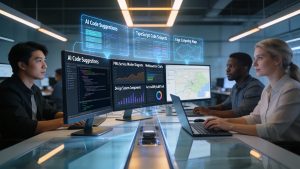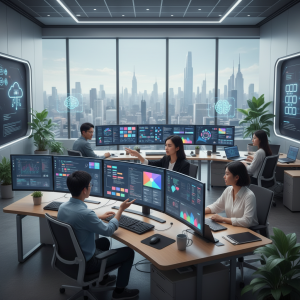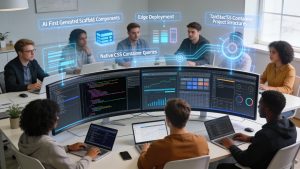OpenAI’s DevDay 2025 event marked a turning point in AI application development, introducing new agent frameworks, expanded model options, and collaborative tooling for building integrated app experiences within ChatGPT. As the developer community continues to push boundaries, OpenAI’s focus on maturity—combining robust software workflows with accessible agent frameworks—signaled its ambition to transform chat into an all-purpose, unified interface for software, collaboration, and commerce.
Apps Inside ChatGPT: The Conversational Browser
A highlight of DevDay was the preview of the Apps SDK, enabling third-party developers to build interactive applications that run directly inside ChatGPT. App partners like Canva, Figma, Coursera, Expedia, Spotify, and Zillow showcased live demos where users could design, search, or transact—all within a chat interface. As this ecosystem grows, OpenAI plans to introduce an app directory, a review system, and monetization guidelines later in the year.
This conversational browser redefines user experience. Instead of switching between tabs and applications, users interact with apps in a seamless, context-rich chat thread—paving the way for integrated workflows and agent-driven assistance.
AgentKit: End-to-End Agent Development
OpenAI announced AgentKit, a toolkit designed for building, evaluating, and deploying autonomous agents suitable for production workloads. It features a visual Agent Builder for workflow orchestration, a Connector Registry to govern data access, and ChatKit for embedding agent UIs. Built-in evaluation and trace capabilities help engineering teams debug sequences, monitor metrics, and refine agent behavior before scaling.
The open-source Agents SDK enables portability and compliance for regulated industries, allowing developers to operate agent workflows self-hosted with Python or TypeScript bindings.
Model Releases: GPT-5 Pro and Sora 2
OpenAI expanded its model lineup with the launch of GPT-5 Pro, optimized for deep analysis and precision in domains such as finance, legal, and healthcare. It delivers better reasoning and accuracy than previous releases, though feedback pointed to varying latency that teams need to consider when routing tasks between models.
The Sora 2 model brings advanced video generation to the API, introducing sound‑visual pairing and more detailed controls over video output. These enhancements support creative and enterprise-grade content workflows, but developers are urged to prioritize copyright, consent, and provenance when integrating video into commercial products.
Codex: Autonomous Coding Agents
Moving out of research preview, OpenAI Codex became widely available with new SDKs, enterprise admin features, and integrations like Slack. Codex is now positioned as a core tool for “do it for me” workflows—capable of project-wide reasoning, tool invocation, and delivery of functional code artifacts. The shift reflects OpenAI’s broader strategy to support long-running agentic systems that go beyond simple code completion.
Ecosystem Collaboration and Security
While OpenAI’s Apps SDK doesn’t yet integrate with community-led projects like MCP-UI, there are public commitments to interoperability and open standards. OpenAI intends to publish a host environment specification, allowing multiple MCP clients to run third-party apps and enabling a broader ecosystem beyond a single platform.
Security was a recurring theme, especially with the rise of connector-based app integrations. OpenAI’s guidance prioritizes least privilege, explicit user consent, defense-in-depth, and production-grade audit trails to prevent prompt injection and data exfiltration risks.
Developer Reception and Market Context
Reactions from DevDay attendees ranged from cautious optimism to immediate experimentation. Analysts described the event as evolutionary, refining and integrating existing opportunities for mainstream audiences rather than unveiling radically new directions. While enterprise adoption of OpenAI tools remains strong, Anthropic maintains a lead in coding agent market share—particularly for terminal-native workflows and regulated industries.
Conclusion: The Path Forward for Builders
OpenAI DevDay 2025 revealed a developer landscape shifting from research and experimentation to commercial-grade agentic software. With millions of weekly ChatGPT users and expanded tooling for both cloud and local workflows, developers can now build, scale, and monetize applications inside the chat itself. The roadmap includes more open hosting standards, integrated security, and enhanced evaluation for continuous improvement.
For those looking to get started, OpenAI provides detailed documentation and session archives. Developers should familiarize themselves with the Apps SDK, AgentKit, and Codex features—and stay current on best practices for security and compliance as the next wave of conversational software hits the market.
Read more such articles from our Newsletter here.



